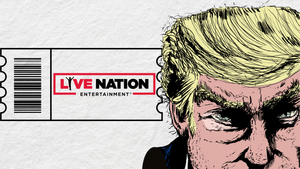Live Nation has welcomed an executive order issued by Donald Trump yesterday that instructs the Federal Trade Commission to ramp up its regulation of secondary ticketing across the US. Kid Rock popped into the White House to ensure the signing of the order got sufficient media attention.
However, the same executive order also instructs government officials to “ensure that competition laws are appropriately enforced in the concert and entertainment industry”, which will be less welcome news for Live Nation bosses. Because, while the live giant is happy for ticket touts and scalpers to be more tightly regulated, it won’t want even more scrutiny of its own dominant position in the live entertainment market.
Unsurprisingly, Live Nation’s official response to the executive order exclusively focuses on the secondary ticketing elements. “Scalpers and bots prevent fans from getting tickets at the prices artists set”, a spokesperson says, adding gushingly, “we thank President Trump for taking them head-on”.
As markets opened in the US, Live Nation’s share price rose slightly before settling back to around yesterday’s closing price, suggesting that - despite a sharp initial drop in after hours trading - the potential implications for the live giant were not being seen as a major threat by investors.
The US National Independent Venue Association welcomed all elements of Trump’s executive order. Its Executive Director Stephen Parker says that Trump’s order will “help address the two problems jeopardising the well-being of artists, independent stages, and fans: a predatory, unchecked resale market where bots and deceptive practices price gouge fans and the Live Nation monopoly that forces small businesses to shut their doors”.
Trump’s order says that both the FTC and the US Attorney General should “ensure that competition laws are appropriately enforced in the concert and entertainment industry, including where venues, ticketing agents or combinations thereof operate to the detriment of artists and fans”.
Of course, the Attorney General’s Department Of Justice is already enforcing competition law against Live Nation and its Ticketmaster subsidiary via a lawsuit launched while Joe Biden was President.
Live Nation hoped that the DoJ, under Trump, would become less interventionist in the competition law domain, resulting in that litigation being quietly dropped. However, a judge recently declined to dismiss elements of the DoJ’s lawsuit, and yesterday’s executive order is seen by some as confirming that the antitrust action against Live Nation may continue.
Regulation of event ticketing, including secondary ticketing, mainly sits at a state level in the US, and the rules vary considerably around the country.
However, there is some US-wide federal regulation too. In particular the Better Online Tickets Sales Act - or BOTS Act - passed at the end of Barack Obama’s presidency in 2016, which prohibits the use of special software, or bots, by ticket scalpers to hoover up tickets from the primary ticketing platforms in order to resell them for profit on the resale sites.
Better enforcing that law is a key part of Trump’s executive order. The FTC, he writes, should “rigorously enforce the BOTS Act, and collaborate with State Attorneys General or other state consumer protection officers on enforcement of the BOTS Act, including by providing such state officials with information or evidence obtained by the FTC when consistent with applicable law”.
Given his disdain for past Presidents, it’s somewhat ironic that - as well as seeking better enforcement of a law passed under Obama - Trump’s order also reinforces a regulation put in place by the FTC in the final month of Biden’s presidency. That being the ‘junk fee rule’ that says ticketing platforms must declare the full cost of a ticket, including all fees, upfront in the ticket buying process.
Trump’s order says that the FTC should “take appropriate action, including proposing regulations if necessary, to ensure price transparency at all stages of the ticket-purchase process, including the secondary ticketing market”.
There have been various proposals in Congress in recent years for new US-wide federal laws regulating the ticketing business. Live Nation has been working hard to encourage lawmakers to focus on regulating secondary rather than primary ticketing.
The live giant is very much involved in ticket resale itself within the US, but would still prefer for the scalpers to be regulated, even if they are using a Ticketmaster-owned platform to resell their tickets.
That strategy has even seen Live Nation start to vocally support regulation of secondary ticketing beyond the BOTS Act and pricing transparency, including the proposal that a price cap be introduced, restricting how much a scalper can mark up the price of a ticket during the resale process.
The live giant’s CEO Michael Rapino first indicated support for resale price caps when speaking at a conference last year and that position is solidified in the company’s response to Trump’s executive order, which concludes “We support any meaningful resale reforms, including more enforcement of the BOTS Act, caps on resale prices, and more”.
With all that in mind, Live Nation will be hoping that Trump’s instructions around resale take priority over that one requesting that competition laws are appropriately enforced.
The President also asks his officials to prepare a report on ticketing which should explain how his order is being implemented and also make “recommendations for regulations or legislation necessary to protect consumers with respect to the live concert and entertainment industry”.
That’s a wide brief. Live Nation’s lobbyists will presumably be seeking to ensure any recommendations are scalper centric.

